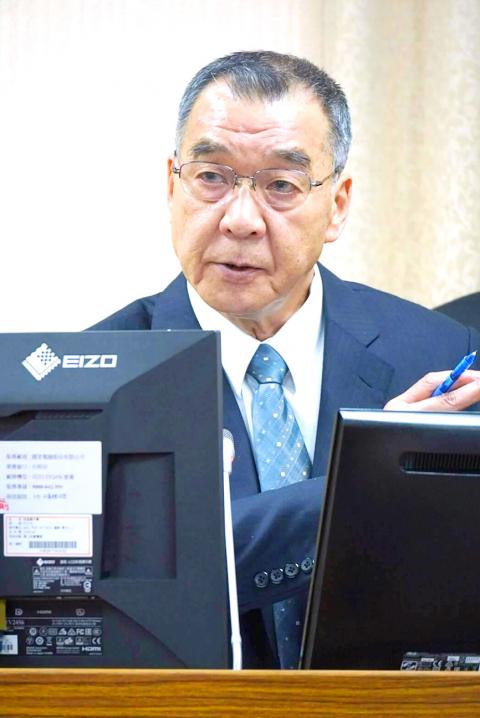The National Security Bureau (NSB) has announced that it plans to amend the Government Password Standardization Act (政府機關密碼統合辦法) and design a new defense mechanism to shield government Web sites and systems from Chinese hacking.
The changes would step up the enforcement of regulations and offer incentives for civil servants to observe rules for protecting classified materials, the bureau said.
Local and overseas government units were found to be lax in managing and safeguarding information, and have an outdated concept of security, the bureau said, adding that overseas personnel do not observe necessary security protocols when handling classified materials or equipment.

Photo: Tu Chu-min, Taipei Times
Some personnel even use classified equipment for personal use, which increases the risk of leaking classified information, it said.
“This laxness amid efforts by China to hack into our government information systems is quite alarming,” the bureau said.
Government agencies at every level must enforce security protocols and defense mechanisms for the proper handling of classified equipment, the bureau said.
The array of equipment and environments has necessitated the amendments, which would give agencies a reference to follow to mitigate risks, it said.
Passage of the amendments would ensure that encoding; research and development for new codes; and verification processes adhere to regulations and at least meet safety standards of a certain level, it added.
Oversight agencies must ensure that units’ efforts are improved if found to be deficient, the bureau said.
The amendments say that an emergency that compromises the safety of classified equipment and documents would require their evacuation or immediate destruction.
A joint task force would be established to oversee all password-related affairs for overseas units, including the allocation, or recall and destruction, of classified equipment, they say, adding that the task force would assemble and maintain security-related hardware.
Recent cases of suspected Chinese hacking have included a Nov. 7 claim made on Facebook by National Sun Yat-sen University associate professor Chen Chih-chieh (陳至潔) that university professors specializing in political science or cross-strait studies have had their e-mails monitored — some for up to three years — by someone posing as a school official.
National Defense University military instructor Chang Ling-ling (張玲玲) on Tuesday last week said that she has witnessed two hacking incidents.
In 2005, a Chinese Trojan horse program embedded in an e-mail was sent to the university’s staff e-mail system and gained access to the network, she said.
In 2008, Chinese hackers sent her two e-mails in Korean, Chang said.
The first e-mail — whose senders were aware that she was in South Korea at the time — said that she was being sued and included a file that was supposedly a litigation notice, while the second e-mail said that she was being offered a position to teach Korean at an unnamed university in Taiwan, she said.

NATIONAL SECURITY THREAT: An official said that Guan Guan’s comments had gone beyond the threshold of free speech, as she advocated for the destruction of the ROC China-born media influencer Guan Guan’s (關關) residency permit has been revoked for repeatedly posting pro-China content that threatens national security, the National Immigration Agency said yesterday. Guan Guan has said many controversial things in her videos posted to Douyin (抖音), including “the red flag will soon be painted all over Taiwan” and “Taiwan is an inseparable part of China,” while expressing hope for expedited “reunification.” The agency received multiple reports alleging that Guan Guan had advocated for armed reunification last year. After investigating, the agency last month issued a notice requiring her to appear and account for her actions. Guan Guan appeared as required,

Japan and the Philippines yesterday signed a defense pact that would allow the tax-free provision of ammunition, fuel, food and other necessities when their forces stage joint training to boost deterrence against China’s growing aggression in the region and to bolster their preparation for natural disasters. Japan has faced increasing political, trade and security tensions with China, which was angered by Japanese Prime Minister Sanae Takaichi’s remark that a Chinese attack on Taiwan would be a survival-threatening situation for Japan, triggering a military response. Japan and the Philippines have also had separate territorial conflicts with Beijing in the East and South China

A strong cold air mass is expected to arrive tonight, bringing a change in weather and a drop in temperature, the Central Weather Administration (CWA) said. The coldest time would be early on Thursday morning, with temperatures in some areas dipping as low as 8°C, it said. Daytime highs yesterday were 22°C to 24°C in northern and eastern Taiwan, and about 25°C to 28°C in the central and southern regions, it said. However, nighttime lows would dip to about 15°C to 16°C in central and northern Taiwan as well as the northeast, and 17°C to 19°C elsewhere, it said. Tropical Storm Nokaen, currently

PAPERS, PLEASE: The gang exploited the high value of the passports, selling them at inflated prices to Chinese buyers, who would treat them as ‘invisibility cloaks’ The Yilan District Court has handed four members of a syndicate prison terms ranging from one year and two months to two years and two months for their involvement in a scheme to purchase Taiwanese passports and resell them abroad at a massive markup. A Chinese human smuggling syndicate purchased Taiwanese passports through local criminal networks, exploiting the passports’ visa-free travel privileges to turn a profit of more than 20 times the original price, the court said. Such criminal organizations enable people to impersonate Taiwanese when entering and exiting Taiwan and other countries, undermining social order and the credibility of the nation’s